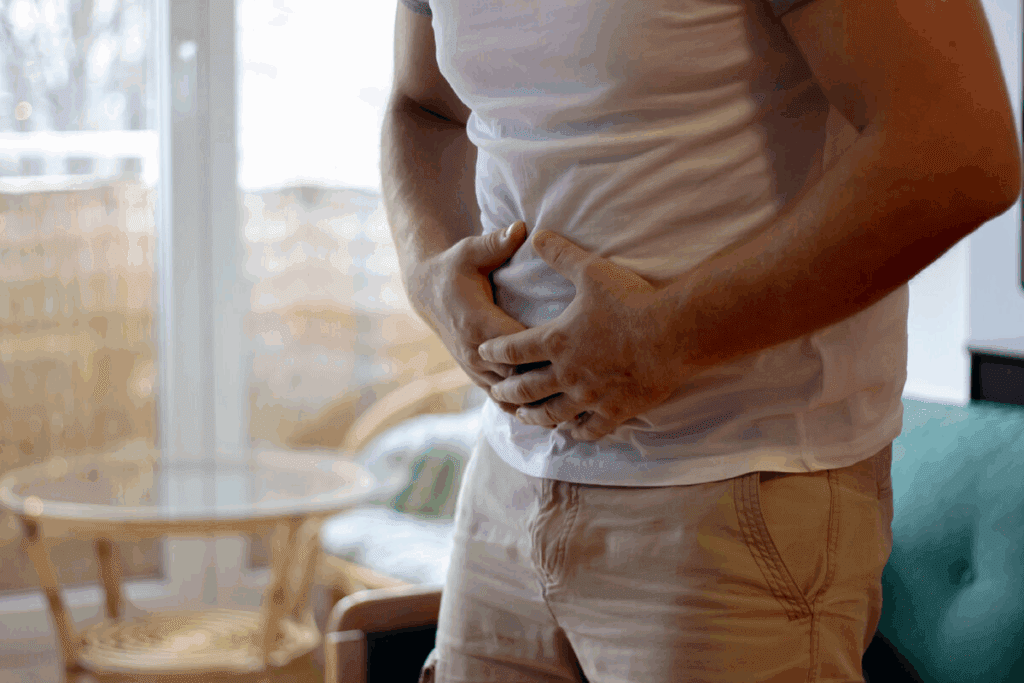Last Updated on November 26, 2025 by Bilal Hasdemir

Colon blockage, or bowel obstruction, is painful and distressing. At Liv Hospital, we use top-notch protocols and academic paths for managing bowel obstruction. This ensures our patients get the best care.Learn how to get rid of blockage in colon with 7 of the best natural remedies and home treatments for constipation and mild blockages.
Natural remedies and home treatments can ease symptoms and boost digestive health with medical safety confirmation. We look into different ways to clear a bowel blockage naturally. This includes changing diets and staying hydrated.
We mix medical know-how with empathy, offering full support and guidance. By using the latest treatments, we help patients deal with bowel obstruction well.

Colon blockage, or bowel obstruction, is a serious issue that needs quick attention. It happens when the intestine’s flow is blocked, either a bit or completely. This can cause serious problems if not treated right away.
Bowel obstruction can come from many things, like what we eat, how active we are, and health problems. Some common reasons include:
It’s important to know the signs of colon blockage to get medical help fast. Common signs are:
| Symptom | Description |
| Abdominal Pain | Severe cramping or ongoing pain in the belly. |
| Constipation | Hard time passing stools or much less bowel movements. |
| Vomiting | Nausea and vomiting, which can be bilious or feculent. |
| Bloating | Stomach swelling due to gas or intestinal contents buildup. |
A medical expert says, “Spotting these signs early can greatly help in treating bowel obstruction.”
“The key to managing colon blockage effectively lies in understanding its causes and recognizing its symptoms early.”
It’s key to tell apart partial and complete blockage. This affects how treatment is done. A partial blockage lets some stuff through, while a complete blockage blocks everything.
Partial Blockage: Symptoms might come and go, with some relief in between.
Complete Blockage: Symptoms are usually worse and don’t stop, needing quick medical help.
Knowing the type of blockage helps doctors plan the best treatment for each person.

It’s important to know the difference between symptoms that need immediate medical help and those you can handle at home. Colon blockage can show up in many ways. Knowing when to get help is key.
Certain symptoms mean you need to see a doctor right away. These include:
Mild colon blockage, like mild constipation or bloating without pain or vomiting, can be treated at home. Home treatments might include changing your diet, staying hydrated, and using natural remedies.
Always talk to a healthcare provider before trying home treatments. They can check how serious your condition is and suggest the best course of action. This is important to make sure you’re not missing a more serious problem.
By knowing when to go to the doctor and when to treat yourself at home, you can take better care of your colon health.
Eating more fiber is a simple way to prevent colon blockages and keep your bowels healthy. Fiber makes stool softer and helps it move better. This makes it easier to pass stool and lowers the chance of blockages.
Fiber is in two forms: soluble and insoluble. Soluble fiber turns into a gel in water, softening stool. Insoluble fiber adds bulk, helping stool move regularly.
Both kinds of fiber are key for a healthy colon. Soluble fiber can lower cholesterol and control blood sugar. Insoluble fiber prevents constipation by keeping stool moving.
It’s important to add fiber slowly to let your gut adjust. Too much fiber at once can cause discomfort like bloating and cramps. We suggest adding fiber gradually over weeks or months to avoid these issues.
Start with small increases, like an extra fruit or veggie a day. Drinking lots of water also helps fiber move through your system.
Eating foods high in fiber is great for your colon. Some top choices include:
These foods are not just high in fiber. They’re also packed with vitamins, minerals, and antioxidants for overall health.
Drinking enough water is key to avoiding colon blockage. It makes stool softer and helps with regular bowel movements. Keeping your digestive system healthy is simple with enough water.
The right amount of water varies by age, sex, weight, and how active you are. Most say drink at least eight 8-ounce glasses a day. But, some studies say this might not be enough, especially for colon blockage.
To figure out how much water you need, think about your lifestyle. If you’re active or live in a hot place, you might need more. Paying attention to how your body reacts to water helps find the right amount.
| Activity Level | Recommended Daily Water Intake |
| Sedentary | 8-10 glasses |
| Moderately Active | 10-12 glasses |
| Very Active | 12-15 glasses |
Drinking water is good, but some herbal teas can help too. Peppermint, chamomile, and ginger teas have anti-inflammatory properties. They can calm your digestive system.
Staying hydrated is important, but so is avoiding drinks that dehydrate you. Coffee, alcohol, and sugary sodas can make dehydration worse and worsen colon blockage symptoms.
To stay hydrated, limit or avoid:
By focusing on drinking enough water and choosing the right herbal teas, while avoiding dehydrating drinks, you can soften stool and ease colon blockage.
Adding certain fruits to your meals can help with colon blockage. Some fruits have natural laxative effects. They can make bowel movements easier and help with constipation.
Prunes, or dried plums, are great for digestive health. They have lots of fiber and sorbitol. Sorbitol softens stool and helps with bowel movements. Prune juice can also quickly ease constipation.
“Prune juice is a natural and effective way to relieve constipation, thanks to its high sorbitol content.”
A study in the Journal of Agricultural and Food Chemistry shows prunes help with constipation.
Other fruits like kiwi and pears are good for the colon. Kiwi has actinidain, which aids digestion. Pears are full of fiber and pectin, which softens stool.
Fruit smoothies are tasty and easy to make. They mix colon-friendly fruits for better digestion.
| Fruit | Benefit |
| Prunes | Rich in fiber and sorbitol |
| Kiwi | Aids digestion with actinidain |
| Pears | High in fiber and pectin |
To make a good smoothie, mix prunes, kiwi, and pears with water or non-dairy milk. Adding yogurt or kefir boosts probiotics.
Adding these fruits and smoothies to your diet helps keep your colon healthy. It also helps with colon blockage naturally.
Physical activity can greatly improve your digestive health and ease colon blockage symptoms. Regular exercise keeps your bowel habits healthy. It also helps stimulate bowel movements, easing the discomfort of colon blockage.
Gentle exercises can help move your bowels without straining your body too much. Brisk walking and light jogging are great options. These exercises get your intestines moving, helping waste pass through your colon.
Stretching exercises and light aerobics are also good. They not only help with bowel movements but also boost your digestive health.
Yoga poses can offer a lot of relief for digestive problems, like colon blockage. Pawanmuktasana (Wind Relieving Pose) and Bhujangasana (Cobra Pose) are especially helpful. They stimulate digestion and ease discomfort.
Other good yoga poses include Uttanpadasana (Raised Leg Pose) and Supta Baddha Konasana (Reclined Bound Angle Pose). These poses improve blood flow to your digestive organs and help you relax. This can help with colon blockage relief.
It’s important to have a regular exercise routine for healthy bowel habits and to prevent colon blockages. Start with gentle exercises and gradually increase the intensity and duration as you get stronger.
Your exercise routine should include cardio, strength training, and flexibility exercises. This mix improves your overall health and lowers the risk of colon blockage.
Adding physical activity to your daily life can greatly improve your digestive health and reduce colon blockage symptoms. Regular exercise, along with natural remedies and lifestyle changes, can offer lasting relief and improve your overall well-being.
Abdominal massage can help move your bowels and ease blockages. It’s good to add gentle massage to your daily routine. This can help your digestive health and ease bowel obstruction symptoms.
To do an effective abdominal massage, follow these steps:
Certain pressure points on the abdomen can provide additional relief from bowel obstruction. These include:
Applying gentle pressure to these areas can help alleviate symptoms and promote digestive health.
For optimal results, we recommend performing abdominal massage daily, ideally at the same time each day. Consistency is key to relieving bowel obstruction and promoting long-term digestive health.
Tips for Effective Abdominal Massage:
By incorporating abdominal massage into your daily routine, you can help relieve bowel obstruction and promote overall digestive well-being.
Keeping your gut microbiome healthy is key for good digestion. Probiotics are live microorganisms that offer health benefits when eaten in the right amounts. They help keep the balance of gut bacteria, which is vital for digestion and health.
Probiotic-rich foods are great for gut health. Yogurt and kefir are top choices, packed with beneficial bacteria. Foods like sauerkraut, kimchi, and miso are also full of probiotics. These foods add good bacteria to your gut, boosting digestion and immunity.
Adding these foods to your diet is easy. Start with yogurt and fruit for breakfast or mix kefir into smoothies. Use fermented foods in salads or main dishes to add flavor and nutrition.
While foods are good, some might need supplements. When picking probiotic supplements, look at the strain, CFU count, and expiration date. Different strains offer different benefits, so choose one that fits your health needs.
Talk to a healthcare provider before starting supplements. They can suggest the best probiotic for your health.
A microbiome-friendly diet is full of fiber, which feeds good gut bacteria. Include fruits, veggies, whole grains, and legumes. Eating a variety of these foods supports a healthy gut.
By eating probiotic-rich foods and a fiber-rich diet, you can greatly improve your gut health and overall well-being.
Resistant starches are found in many foods and are great for colon health. They are not fully digested in the small intestine. Instead, they feed the good bacteria in the colon.
This helps keep the gut healthy. It’s a key role in maintaining a balanced gut.
Green bananas, potatoes, and legumes are full of resistant starch. These foods also offer other important nutrients. For instance, green bananas are packed with potassium, and legumes are high in protein and fiber.
In the colon, resistant starches are broken down by good bacteria. This process makes short-chain fatty acids. These acids give energy to the colon’s lining and keep it healthy.
By supporting good bacteria, resistant starches help maintain a healthy gut balance.
To get the most from resistant starches, add them to your meals. Try cooked and cooled potatoes, green bananas, and legumes. Also, use cooled rice or pasta in salads for more resistant starch.
Exploring different recipes and meal plans can make it fun to include these foods in your diet.
By adding resistant starches to our diet, we can greatly improve our colon health and overall well-being.
Liquid remedies are a gentle way to help with bowel blockages. They can make stool softer, help move it, and ease constipation.
A saltwater flush is a well-known remedy. Mix 1 teaspoon of sea salt with 1 quart of warm water. Stir until the salt is dissolved. Drink it on an empty stomach, best in the morning. It draws water into the colon, softening stool and encouraging a bowel movement.
Aloe vera juice is also a good remedy. It has anti-inflammatory properties that soothe the digestive tract and aid healing. Aloe vera juice can also reduce inflammation in the gut, making it easier to pass stool. Make sure to pick a pure, additive-free aloe vera juice.
Mixing olive oil with lemon juice is a strong remedy. Olive oil’s healthy fats lubricate the digestive tract, while lemon juice boosts digestion. Mix equal parts of olive oil and lemon juice and drink it on an empty stomach. This mix can help stimulate bowel movements and ease constipation.
It’s important to use liquid remedies carefully. Overuse or improper preparation can cause side effects like dehydration, electrolyte imbalance, or stomach cramps. Always talk to a healthcare provider before trying new remedies, especially if you have health issues or are pregnant.
By knowing how to use these liquid remedies, people can find relief from bowel blockages and better their digestive health.
To avoid colon blockages, lasting lifestyle changes are key. These changes help keep our colon healthy. They also improve our overall health.
Good daily habits are essential for colon health. Eating a balanced diet with lots of fiber is important. Drinking water and exercising regularly also helps. We should also listen to our body’s urge to go to the bathroom and avoid straining.
Key Daily Habits:
Some foods can cause colon blockages. Knowing which ones to avoid is important. Foods high in fat and low in fiber can slow digestion and increase blockage risk.
| Food Category | Examples | Impact on Colon Health |
| High-Fat Foods | Processed meats, fried foods | Can slow digestion and contribute to blockages |
| Low-Fiber Foods | White bread, processed snacks | Can lead to constipation and increase blockage risk |
| Processed Foods | Packaged snacks, ready meals | Often low in fiber and high in unhealthy fats |
Stress can harm our digestive health and lead to colon blockages. It’s important to manage stress well for a healthy digestive system.
Stress Management Techniques:
By making these lifestyle changes, we can lower the risk of colon blockages. We also improve our digestive health.
Creating a personalized colon health plan is key for good digestive health. It involves making dietary changes, staying hydrated, exercising, and managing stress. These steps help prevent colon blockages and boost overall health.
We’ve talked about natural ways to ease colon blockage. This includes eating more fiber, drinking plenty of water, and eating probiotic foods. Knowing what causes and shows colon blockage helps people act early to stop it.
To make a plan that fits you, talk to healthcare experts. They can help you increase fiber, suggest gentle exercises, and find ways to relax. This is important for your health.
By focusing on colon health, you can lower the chance of future blockages. We urge you to be proactive in making a plan that suits your needs and health goals. This way, you can keep your digestive system in top shape.
To loosen a bowel blockage at home, drink lots of water. Eat foods high in fiber like fruits and veggies. Try natural laxatives like prunes or prune juice.
Gentle exercises and abdominal massage can also help. They stimulate bowel movement.
Natural remedies for intestinal blockage include eating more fiber. Foods like fruits, veggies, and whole grains are good. Stay hydrated too.Herbal teas that support digestive health are helpful. Probiotics, resistant starches, and fruits like kiwi and pears are also beneficial.
To clear a bowel obstruction naturally, change your diet and stay hydrated. Increase fiber intake slowly. Drink lots of water.Do gentle exercises like walking or yoga. Abdominal massage and liquid remedies like aloe vera juice can also help.
Foods high in fiber, like fruits, veggies, and whole grains, prevent colon blockages. Eat probiotic-rich foods like yogurt and kefir. Fermented foods are good too.Resistant starches in green bananas, potatoes, and legumes are also beneficial.
Yes, physical activity can relieve colon blockage. Gentle exercises like walking and yoga are good. They stimulate bowel movements.Regular exercise keeps your bowel habits healthy. It prevents future blockages.
To prevent future colon blockages, eat a balanced diet rich in fiber. Stay hydrated and exercise regularly. Manage stress too.Avoid foods that can cause blockages. Keep your gut microbiome healthy.
Yes, some yoga poses help with digestive relief. Poses that twist or gently press the abdomen are good. They stimulate bowel movements and relieve discomfort.
Probiotics support gut health and relieve colon blockage. They promote a balanced gut microbiome. Find them in probiotic-rich foods like yogurt and kefir, or take supplements.
Resistant starches are in foods like green bananas, potatoes, and legumes. Cooking and cooling these foods increases their resistant starch content. This makes them better for gut health.
Liquid remedies for bowel blockage include a safe saltwater flush and aloe vera juice. A mixture of olive oil and lemon juice can also help. But use these remedies carefully and know the potential side effects.
Seek medical attention immediately if you have severe abdominal pain, vomiting, or fever. These signs may indicate a complete blockage or other complications.
Dahmiwal, T., et al. (2024). Dietary considerations in cholecystectomy. Journal of Gastrointestinal Surgery, 28(5), 345-350. Retrieved from
Subscribe to our e-newsletter to stay informed about the latest innovations in the world of health and exclusive offers!